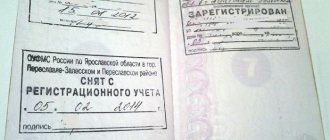Having a share in an apartment or house, you can dispose of it as you wish. Including registering anyone as a shared owner. This person may or may not be your relative, it makes no difference. But serious conflicts often arise on this basis.
What to do if, for example, a tenant registered as a shareholder drinks and interferes with the lives of others? What to do if your ex-husband refuses registration for your new husband? Of course, a lot is specified in the law. But each case is individual. Therefore, we will give you general information, but we recommend that you consult with a housing specialist regarding your specific situation.
Don't have time to read the article?
Get an initial consultation from several companies for free
: fill out an application and the system will select suitable companies!
143 companies are connected to this service
Start selection in a few clicks >
The registration rules are regulated by Federal Law No. 5242–1 “On the right of citizens of the Russian Federation to freedom of movement, choice of place of stay and residence within the Russian Federation” dated June 25, 1996. It stipulates the terms and conditions of permanent and temporary registration, as well as sanctions for failure to register at the place of residence.
Why does a citizen need registration?
Without registration, a citizen of the Russian Federation cannot officially find employment, and will also not be able to send their children to kindergarten or school.
Registration is a requirement for a number of legal procedures.
Accounting authorities
The registration of citizens of the Russian Federation and foreigners is carried out by the Federal Migration Service. It is to its department that documents must be submitted, after review of which the applicant is given a permanent registration stamp in his passport, or is issued a document confirming temporary registration at a specific address.
Registration procedure and deadlines
After being discharged from the previous month, within 7 days, citizens of the Russian Federation are required to register at their new place of stay. Otherwise they will be punished with a fine.
If you do not have a permanent place of registration, you can apply for temporary registration for 90 days.
Conditions for registration in a shared apartment or house
Common property becomes shared property for various reasons. The owner can donate or inherit it to several persons. It is also possible to divide the property of spouses during a divorce. In this case, you can get both a real share - that is, a room or several rooms - and an ideal one. An ideal part of an apartment or house in fractional terms is called - for example, ¼ of the entire area.
If you are the owner of shared property, then you can register any person in your living space. But for this you need to obtain written consent from the co-owners. The exception is when you want to register your child (under 14 years old). Then the consent of other shareholders is not necessary. Although here, too, the law provides for circumstances that make it possible to evict a minor.
When it comes to a private home, the rules are slightly different. The consent of the co-owners is only needed when the house has a common entrance and common non-residential premises: kitchen, bathroom, etc. This rule does not apply to isolated premises with a separate entrance.
You can apply for registration at the passport office, the migration service, the Multifunctional Center (MFC) or through the State Services website.
The concept of registration
Although the term “propiska” is not used in regulatory documents of Russian legislation, many people habitually use it to mean “registration”. And although there is a fundamental difference between these concepts, in modern realities they are analogues of each other.
According to current legislation, registration of a citizen at a specific address is of a notification nature, but is mandatory ().
Ignoring this requirement will result in penalties. The violator will have problems with employment, seeking medical help, enrolling the child in kindergarten and other pressing issues.
The registration procedure for a dwelling that has one owner is simpler than the registration procedure for real estate in shared ownership.
Required documents
When contacting official authorities in person, it is important that all co-owners of shared ownership are present. They draw up consent for registration and attach it to the main package of documents, consisting of:
- Passports of the applicant (person who needs registration).
- Birth certificates of a child under 14 years of age or passports - from 14 to 18 years of age.
- Military ID (for those liable for military service).
- Certificates of release from places of imprisonment (for convicted persons).
- Applications in form No. 6.
- Documents confirming ownership of the share where registration is being issued, and the legality of its acquisition.
- Consent of co-owners of the living space.
There is no strict form of consent itself. If it is drawn up in writing, it must contain the following information:
- passport details;
- place of registration;
- consent to stay;
- applicant details;
- date and signature.
It is not necessary to notarize a document, except in cases where it must have a clear validity period. Otherwise, consent is considered unlimited. During a personal visit to the passport office, you do not have to write consent, but give it verbally by presenting your passport.
However, the child is automatically registered in the apartment, and nothing depends on the opinions of other owners. According to Art. 20 of the Civil Code of the Russian Federation, children under 14 years of age live where the father and (or) mother are registered. Before receiving a passport, the application is written for them by their parents, after that - by the children themselves, but in the presence of their parents.
Rights of registered
Registration involves recording the location of a person, which is necessary for government agencies to register citizens. But registration itself does not give rise to any rights, not even the right to use the premises. It is implemented by other agreements: the express consent of the owner, a lease agreement, a purchase and sale agreement, a privatization agreement, a social lease agreement. However, it still does not give the right to dispose of housing. A citizen, having registered in it, cannot implement it without having a direct power of attorney from the owners of the apartment.
If the homeowners decide to sell the property, then consent to this from the citizen registered in it will not be required.
Nuances of registration through State Services and MFC
If you want to register someone in your shared ownership through State Services, the package of documents will be the same. But you will additionally need an extract from the house register and copies of the passports of the co-owners. And it is important to understand that registration is impossible completely remotely. Through the website you will send an application to the Ministry of Internal Affairs (Office of the Ministry of Internal Affairs). On the appointed day, you will have to report to your local branch with the original documents. And only then will they give you a stamp.
To apply for registration through the MFC, you need the same documents as for the migration service or passport office. But the difference lies in the timing. The passport office allows 3 days for the entire procedure. The MFC sends documents for verification to the Ministry of Internal Affairs, so the period increases to 6–10 working days.
Temporary and permanent registration
Temporary registration is, in fact, the same as regular registration, but with a time limit. It is relevant mainly for those people who have moved to another city, students who do not have their own housing, and so on. Temporary registration, in terms of paperwork and all other rules, is no different from permanent registration. The main and only difference: the registration stamp is not placed in the passport. For this purpose, a separate, special sheet is issued, which indicates where the person currently lives.
Registering in an apartment with shared ownership can be quite difficult due to the active opposition of the co-owners. At a free consultation, experienced lawyers will help you sort out the main controversial issues, and they are ready to act as representatives of the client, proving his case to all interested parties.
FREE CONSULTATIONS are available for you! If you want to solve exactly your problem, then
:
- describe your situation to a lawyer in an online chat;
- write a question in the form below;
- call Moscow and Moscow region
- call St. Petersburg and region
Save or share the link on social networks
(
2 ratings, average: 4.50 out of 5)
Author of the article
Natalya Fomicheva
Website expert lawyer. 10 years of experience. Inheritance matters. Family disputes. Housing and land law.
Ask a question Author's rating
Articles written
513
- FREE for a lawyer!
Write your question, our lawyer will prepare an answer for FREE and call you back in 5 minutes.
By submitting data you agree to the Consent to PD processing, PD Processing Policy and User Agreement
Useful information on the topic
3
Eviction of a registered person from a municipal (non-privatized) apartment
After living for a long time under a social tenancy agreement, many citizens consider...
4
Eviction of students from the dormitory
Over time, laws change and are supplemented with new relevant articles, of which...
2
How to evict your ex-husband from your apartment
Any divorce process is always accompanied by the division of joint property. If so...
How to find out whether an apartment is privatized or not
The easiest way to understand whether an apartment is privatized or not is to check...
Privatization of a dacha, a house on a dacha plot, a dacha plot
Despite the fact that the right to privatization already exists far away...
How long does it take to privatize an apartment?
Privatization of an apartment is a lengthy procedure consisting of several stages...
What to do if co-owners are against registration?
Unfortunately, for various reasons, shareholders are often on bad terms. This is especially true for divorced couples, but there may be other options. In general, neighbors sometimes turn out to be against registration without any reason. What can be done in this case?
Here you can go two ways: allocate a share of property in kind or try to sell part of your living space. The first option is not suitable for anyone - it requires redevelopment of housing. If you allocate a share in kind, it is necessary not only that the premises be isolated, but also that communications “do not intersect.”
The second option is to sell your part of the living space or issue a deed of gift. Let's say right away that selling is risky. Co-owners can take advantage of Art. 250 of the Civil Code of the Russian Federation - the primary right to buy out a share. The shareholders' consent is not required to formalize the deed of gift. But you must understand that if you donate your share or part of it, the new owner will be able to dispose of it at his own discretion.
Example of conflict resolution
Let's see how all this works in practice. For example, let's take a married couple who own shared property. Upon divorce, each spouse received ½ of the common apartment. After some time, the co-owner remarried and decided to register a new husband. However, the ex-husband is categorically against it for some reason. What can an ex-wife do?
The best way out is to give your new spouse part of your share. Then he will become the full owner of ¼ of the living space and will be able, for example, to register children from his first marriage, if he has any.
Features of registration in a communal apartment
An apartment in shared ownership has much in common with communal housing, in which living space is distributed according to social tenancy agreements, or where the owners live, whose personal accounts per square meter are divided.
The legislation does not clearly define how the status of a communal apartment is assigned. Such objects may be the property of the municipality or belong to citizens.
(Article 42) establishes that a share in the ownership of common property in communal housing is equivalent to the ownership of a room.
The law does not oblige the co-owner of a communal apartment to obtain the consent of the other owners when registering third parties in the room.
In an effort to obtain registration in the capital and metropolitan areas, citizens agree to purchase part of a home and ask whether it is possible to register for a share of 2 square meters. And although the law does not establish a minimum size of living space that can be alienated by the owner, the widespread practice of such real estate transactions in recent years does not meet the expectations of buyers. They increasingly began to be denied registration with a tiny share in the common property.
How to prevent unwanted registration?
Let's consider the reverse situation. You are a co-owner of the shared property. Some of the other shareholders want to register a relative, friend, etc., but you don’t want that. Of course, it is impossible to register a third party without your consent. But another owner can draw up a deed of gift without asking anyone, and then this person will become a co-owner. What to do in this case? Let's look at an example.
The couple divorced and divided the two-room apartment equally. Some time later, the man married again and decided to register his second wife. Since his ex-wife lived in the same apartment, she spoke out against it. But the husband gave part of his property to his new wife, making her a co-owner. Then the ex-wife decided to sell her share to a legal entity. The husband received notification of this. Realizing that the legal entity would try with all its might to get him out of the apartment, he exercised the right to buy out the share at the price offered by his ex-wife.
This is a rather cunning scheme, but it does not violate the law in any way. After all, the shareholder can dispose of his property as he pleases. However, in this case, the wife could go to court with a demand to cancel the registration. Such issues are usually considered on an individual basis.
Claim for recognition of the share as insignificant
In the example we looked at, the husband gave his new wife part of the share. But since he owned one room, it was no longer possible to allocate a share in kind after the deed of gift was drawn up. Because the room cannot be physically divided in half without damaging property.
The ex-wife could insist that the share be recognized as insignificant and demand a forced sale of the property. To do this you need to file a lawsuit. But there is one “but” here. For the claim to be accepted, the defendant must not be interested in the use of the living space. And he must also have other housing.
This method does not apply to our example. The ex-husband did not want to give up his share and lived in the apartment permanently. Therefore, we had to use a deceptive maneuver. But it is completely within the framework of the law.
Legal consequences of lack of registration
Ignoring notification of the state about a change of residence entails the imposition of penalties under Art. 19.15.1 of the Code of Administrative Offenses of the Russian Federation. This article establishes several types of fines:
- for lack of information about the registration of residents of the constituent entities of the Russian Federation (minimum amount - 2 thousand rubles, maximum - 3 thousand rubles);
- for failure to provide information by residents of federal cities (from 3 thousand rubles to 5 thousand rubles);
- for the lack of registration for home owners (for residents of the regions - the amount increases to 5 thousand rubles and up to 7 thousand rubles for owners of Moscow and St. Petersburg residential premises).
Officials have the right to apply penalties when an offense is detected. The time for registration of registration cannot exceed 7 days when changing permanent location and 90 days after arrival in another region.
What rights does a registered person have?
If you have registered for your shared property, please note that the registered person becomes a full-fledged user of the housing. And when donated, it becomes a co-owner. The new shareholder has the same rights as others. In particular, he can:
- register immediate relatives in the apartment: children, spouses or parents without the consent of other owners;
- use housing as a permanent place of residence;
- pay for housing and communal services and make other payments;
- allow or prohibit the registration of other residents.
Registration registration - and even more so, a property donation agreement - requires a high degree of trust. You should not register housing for people you don’t know.
Let's sum it up
Domestic legislation allows registration in an apartment and with shared ownership. In general cases, this requires the consent of the remaining shareholders, drawn up in writing. If a child of one of the owners is registered, then no consent is required.
To register a person in an apartment, you will need to visit the passport office at the address where the housing is located, providing the employees with all the necessary documentation.
If the shareholders do not agree to register a new person in the apartment, then the owner has 2 options - to allocate the property in kind if the appropriate technical capabilities are available, or to sell/donate the share to the person who planned to register in it. The last option is riskier.
How to evict an unwanted neighbor?
Not in all cases, persons registered or who have purchased a share turn out to be law-abiding citizens. They can poison the lives of neighbors in a house or apartment. But is it possible to get rid of them? A simple application to the prosecutor's office or a lawsuit in court will not be enough. The law protects the rights of citizens. Therefore, there may be two options: to buy part of the living space from an unwanted neighbor or to prove that he does not have legal rights to a share of the property.
In the first case, you will have to persuade the co-owner for a long time. And since we rarely want to evict those who have a good relationship with us from their apartment, it is hardly possible to achieve agreement here. Most likely, the neighbor will name a fantastic price or refuse the offer altogether.
You cannot prove the illegality of property ownership on your own. Only a lawyer can present evidence that the share was purchased by fraud or that the registration was done in circumvention of the law. But if you can convince the judge of this, the property will go to your disposal. And you can either give your neighbor temporary registration or oblige him to vacate his home.
Sources:
Pre-emptive right to purchase
The right to choose a place of stay and residence
Sample application form No. 6
Responsibilities of share owners
In addition to the rights to real estate, co-owners also bear responsibilities for maintaining the housing they own. In accordance with Art. 249 of the Civil Code of the Russian Federation, each co-owner bears the costs of maintaining the property in proportion to his share. Housing maintenance costs mean :
- Payment of utility services;
- Taxes and fees;
- Costs for apartment renovation;
- Costs of repairing the property of an apartment building.
The Housing Code of the Russian Federation also regulates the obligations of owners of residential premises. Thus, Article 30 of the Housing Code states that homeowners must use it for its intended purpose - for living. The owners are responsible for maintaining the premises, and this applies to both residents in an apartment building and in a communal apartment. Owners must keep the apartment clean, follow the rules of residence, and not violate the rights of other residents and neighbors.
Among other things, according to Art. 153 of the Housing Code of the Russian Federation, the owner of the property is obliged to pay fees for housing and communal services in a timely manner. This responsibility is assigned to a citizen from the moment he acquires property rights.
How to register a newborn?
If a mother wants to register her newborn baby, and she herself is the owner of the property in question, then there will be no problems. The designer has the right to submit a package of circulars for consideration without the presence of his child. This is how it should be, because the interests of the teenager are represented by legal representatives. If the child is over 14 years old, he must be present during the preparation of the application order and sign. With registration of a temporary appointment, the procedure follows a similar procedure. None of the owners has the right to refuse to register a young child if his mother is registered in the given territory.
And in order to register a spouse on your territory, the permission of all owners of the property in question is required. The agreement does not need to be certified by a notary office.
When the shared property is allocated and separate, that is, it has a separate exit, bathroom and kitchen, then the owner of the property in question has every right to register a new tenant on his territory without the consent of the other owners.
By place of stay
A Russian who has temporarily moved to another address for a period of more than 90 days is required to register.
Required when moving into:
- hostel for the duration of work on a rotational basis;
- hotel;
- Holiday House;
- housing in the private sector;
- tourist camp;
- recreation center
It is also issued for persons in prison.
Having a temporary registration preserves your permanent registration. Its validity period is limited to five years, after which re-registration is required. A foreigner must notify the Federal Migration Service within seven days from the moment of settling at a specific address.
The maximum period of stay in Russia for persons of foreign countries with a visa-free regime is three months. Re-entry is permitted only after 90 days. Citizens who have issued a visa can reside in the country until the end of its validity.
Accounting for the movement of citizens from other countries is necessary for:
- receiving help in crisis situations.
- implementation of rights and obligations.
- data accounting.
- studying migration flows.
- tourism development.
Arbitrage practice
On behalf of a minor child, the plaintiff filed a claim to recognize the house as a residential premises with the right to register at its location. The basis for going to court was the administration’s refusal to recognize the house as suitable for habitation, since it is located on the territory of a gardening partnership and is part of a sanitary protection zone.
The claim was satisfied by the decision of the Salavat Court. A private house is recognized as fit for habitation with the right to registration. The appeal ruling overturned the court's decision and denied the claim. The plaintiff filed a cassation and, as a basis for recognizing the house as fit for habitation, indicated the presence of an expert opinion accepted by an independent expert and not contested by the defendant. In addition, acting in the interests of a minor child, she indicated that the child has no other place of residence.
Referring to the resolution of the Constitutional Court of the Russian Federation No. 7-P dated April 14, 2008, the cassation came to the conclusion that it is possible to register citizens on the territory of SNT if the residential building is the only dwelling.
Considering the lack of evidence that the house was located within the sanitary zone and the impossibility of recognizing it as non-residential, the cassation instance overturned the contested appeal decision and sent the case to the second instance court for a new trial.











